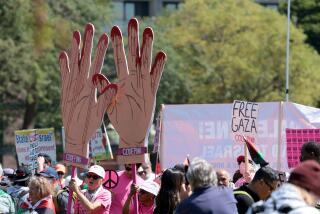Marchers head from Charlottesville to Washington to protest white supremacy
Reporting from Charlottesville, Va. â Singing spirituals and protest songs from the civil rights era, a group of clergy and activists from across the country began a 118-mile march to Washington on Monday to protest white supremacy and demand that President Trump be removed from office.
The long walk will last 10 days and take the marchers across the heart of Virginia â a road of solidly red counties â then straight to the seat of American power, where they plan to engage in protests and nonviolent civil disobedience.
âWe need the country to listen to us, if thereâs going to be change, if weâre going end all the racial hatred,â said Joseph Scott, 23, who works in dining services at the University of Virginia.
Scott was among the thousands of people who took to the streets of Charlottesville, Va., a scenic college town, earlier this month to counter far-right activists who staged a pair of rallies that ended in violence and death.
Dozens were injured in fights, and a counter-protester was killed when a car plowed into the swarm of people.
Since then, a video showing a rallygoer firing a handgun toward the counter-protesters in Charlottesville â and walking away â has surfaced online, further inflaming tensions in a city that has been on edge for weeks. A Baltimore man was arrested Sunday and charged with discharging a weapon into a crowd.
On Monday, under the waning light of an overcast summer evening, organizers of the âMarch to Confront White Supremacyâ called for peace and unity in a series of impassioned speeches before beginning the first leg of their procession.
They also spoke out against the president, placing much of the blame for a rise in white nationalist fervor on his shoulders. They say Trumpâs rhetoric has emboldened the voices of racism that arrived in Charlottesville, a rapidly growing liberal enclave in rural central Virginia.
âThe president will issue an executive order to address voter fraud that doesnât exist,â said Cornell William Brooks, the scholar, minister and former president of the NAACP. âWhen is he going to issue an executive order condemning and confronting the white supremacy that most certainly does exist?â
Brooks and other leaders spoke to about 200 hundred people gathered at Emancipation Park, recently renamed from Lee Park. The crowd stood in the shadow of a towering equestrian statue of Confederate Gen. Robert E. Lee, now shrouded in a black tarp by order of Charlottesvilleâs City Council.
They prayed and sang together just feet from where far-right demonstrators and opponents came to blows Aug. 12 during the âUnite the Rightâ rally.
And then they began to walk, this time escorted by a police officer on a motorcycle stopping cars at intersections along the way. They left the park, turned west down Market Street and marched through the center of Charlottesville as commuters headed home from work. Some honked and gave a thumbs-up as the line of marchers, stretching a city block, kept mainly to the sidewalk.
Kristin Breen, who has lived in Charlottesville for 18 years, was out of town during the violence this month â on vacation in Los Angeles. When she heard about the march on Sunday night, she volunteered to serve as a marshal.
âIt was so hard watching those events unfold from so far away, and hearing about that car hitting all those people,â she said. âWe were in shock. So when I heard about this march, I had to come out.â
And this march carries special symbolic weight, she said. It is beginning exactly 54 years after the Rev. Martin Luther King Jr. led the 1963 March on Washington.
âItâs sad that we have to go back to those days for a model for what to do now,â Breen said. âBut I think the visual â all these people marching peacefully â is pretty powerful.â
In Washington, hundreds of clergy members marched to the U.S. Department of Justice on Monday to protest the words and actions of Trump.
Armengol is a special correspondent.
More to Read
Sign up for Essential California
The most important California stories and recommendations in your inbox every morning.
You may occasionally receive promotional content from the Los Angeles Times.










